TV Review | Game of Thrones: “The Bells” by D B Weiss & David Benioff

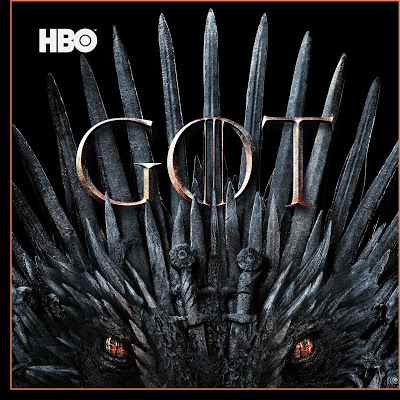 Dark in every sense, “The Long Night” finally put paid to the otherworldly threat posed by the Night King and his Army of the Dead, and it did so in spectacular, unashamedly fan-pleasing fashion. Yet it was with a saddening sense of vindication that I watched all of its significant plot points play out exactly as I had expected, right down to Jorah and Theon’s (admittedly signposted) deaths and, critically, Arya’s last-minute slaying of the Night King. Reading the latter being described as a “twist” in tabloid reviews made me laugh out loud; the show had been overtly building up to it for seven years. We’re talking about a girl whose life after her father’s first-season execution had been nothing but a detailed study in death. On the one hand, I took great pleasure in seeing the fantastic side of Martin’s rich and brutal epic culminate in the way that I’d thought – and hoped – it would, but on the other I was intensely disappointed that the series had lost its capacity to surprise me. To my agony and elation, though, “The Bells” proved to be a perfect counterpoint to “The Long Night”. Endlessly inventive, this time around seasoned battle director Miguel Sapochnik took us down to street level to witness a terrifying assault from far above. Broad daylight illuminated every chink in the characters’ armour as I watched everything that I thought I knew about them, and about
Game of Thrones
, crumble before me.
Dark in every sense, “The Long Night” finally put paid to the otherworldly threat posed by the Night King and his Army of the Dead, and it did so in spectacular, unashamedly fan-pleasing fashion. Yet it was with a saddening sense of vindication that I watched all of its significant plot points play out exactly as I had expected, right down to Jorah and Theon’s (admittedly signposted) deaths and, critically, Arya’s last-minute slaying of the Night King. Reading the latter being described as a “twist” in tabloid reviews made me laugh out loud; the show had been overtly building up to it for seven years. We’re talking about a girl whose life after her father’s first-season execution had been nothing but a detailed study in death. On the one hand, I took great pleasure in seeing the fantastic side of Martin’s rich and brutal epic culminate in the way that I’d thought – and hoped – it would, but on the other I was intensely disappointed that the series had lost its capacity to surprise me. To my agony and elation, though, “The Bells” proved to be a perfect counterpoint to “The Long Night”. Endlessly inventive, this time around seasoned battle director Miguel Sapochnik took us down to street level to witness a terrifying assault from far above. Broad daylight illuminated every chink in the characters’ armour as I watched everything that I thought I knew about them, and about
Game of Thrones
, crumble before me.Since moving beyond George R R Martin’s published works and into that mysterious “roadmap” he reportedly laid out for HBO, Thrones has faced a number of challenges, and one of the greatest of these has been trying to emulate Martin’s gift for striking dialogue. The Song of Ice and Fire author’s fecund lyricism may have inspired a surge of never-ending riffs on lines spoken on the show years earlier, but it wasn’t until last week, when Tyrion said, “We may have defeated Them, but we still have Us to contend with,” that it felt like the show had finally recaptured its old t-shirt-slogan magic. But Tyrion’s line heralded more than just the return of wily wordplay - “The Last of the Starks” was a near-perfect episode, the like of which hasn’t been seen since the show’s fourth season. Underlying every look, every exchange, even every fuck was a tangible sense of unease. The whole episode felt like a coiled spring. Despite the steady flow of wine, there was a chilling sobriety to the hand of the queen’s wise words. Even before learning of Jon’s true lineage and the inevitable dissent that knowledge of it would bring, Tyrion knew that the real enemy wasn’t the manifestation of mortal dread but the divisions between those who’d survived it. In a sentence, the dwarf had become the cleverest man in Westeros once again – and he’d never looked more troubled. As a viewer, though, I couldn’t have been happier. Thrones really was whittling down to a flawed human squabble #ForTheThrone.
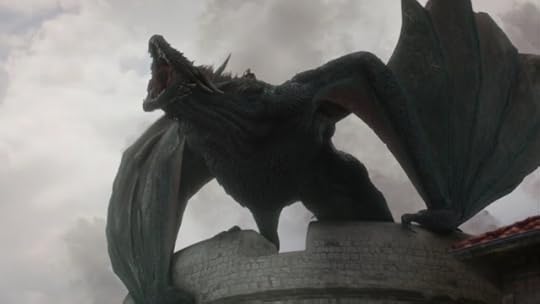 “We won the Great War. Now let’s win the Last War.”
“We won the Great War. Now let’s win the Last War.”With the exception of its obligatory Cleganebowl, which I had pretty much written the stage directions for in my post-“Long Night” predictions, the series’ penultimate episode delivered a relentless precession of shock and awe. Even its more contemplative opening act, which continued this season’s welcome steer back towards the addictive and complex intrigues that first put the show on the map, was ultimately defined by dragonfire and the lingering of an old adage from the books that would set the stall for the rest of the episode: “Every time a Targaryen is born, the gods toss a coin and the world holds its breath...” You see, “The Bells” wouldn’t “just” be the eight-years-in-the-making final battle for King’s Landing. It wouldn’t even just be Varys’s metaphorical coin completing its rotation before crashing to ground aflame. It would be the most shocking episode of the series since the Red Wedding in “The Rains of Castamere” six years ago; perhaps the biggest double-flip in the whole of entertainment since the WWF’s Bret “Hit Man” Hart exchanged cheers for jeers with “Stone Cold” Steve Austin at WrestleMania 13.
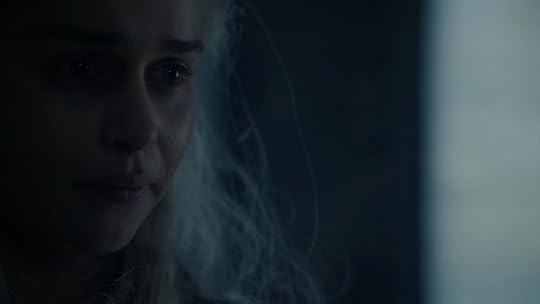 “Let it be fear.”
“Let it be fear.” We don’t know by how much the showrunners have accelerated Daenerys’ fall from grace, but I wouldn’t be surprised if it didn’t eventually fill Martin’s final book, A Dream of Spring, should it ever see publication. The whole saga may be replete with examples of Dany’s ruthlessness, with such instances becoming more frequent and intense the closer she gets to the Iron Throne and the corrupting power that it offers, but in this final run she has fallen farther and faster than I would have ever imagined possible. To the writers’ credit, though, their accelerated take on the story works, and works very well – the abruptness of her descent actually lends it credence when we consider the devastating losses that she’s suffered in quick succession: Viserion, Jorah, Rhaegal, Missandei. Every one of these cruel blows hardened her, ultimately leaving her alone and without good counsel (a soldier whose beloved was beheaded just seconds after telling them to burn the enemy doesn’t quite satisfy the test for “good counsel”, in my view, nor does a dwarf whose loyalties are torn), but nothing seems to have split her spirit so much as her epiphany at last week’s feast. It was all right there, written on her face – the dawning realisation that she could never be as loved a leader as Jon Snow is. Despite all that she’s endured, despite all that she’s accomplished, the biggest obstacle between her and the throne that she’s spent a lifetime looking to reclaim is the man that she loves. Further enraged by his apparent rejection of her as a lover (incest just isn’t in Jon’s wheelhouse), any semblance of restraint melts away and she becomes the very tyrant that she’s sworn to save future generations from the mercies of. It’s heartbreaking, and it’s understandable, and it’s real (which is really quite a statement when discussing a fire-resistant, dragon-riding character whose whole existence is couched in far-flung fantasy). It’s also true to her character, and true to her journey. As unpopular a move as it may be, this episode doesn’t so much turn Daenerys heel as complete her journey down a dark and lonely road that no-one can follow her down - and from which she can never return.
We don’t know by how much the showrunners have accelerated Daenerys’ fall from grace, but I wouldn’t be surprised if it didn’t eventually fill Martin’s final book, A Dream of Spring, should it ever see publication. The whole saga may be replete with examples of Dany’s ruthlessness, with such instances becoming more frequent and intense the closer she gets to the Iron Throne and the corrupting power that it offers, but in this final run she has fallen farther and faster than I would have ever imagined possible. To the writers’ credit, though, their accelerated take on the story works, and works very well – the abruptness of her descent actually lends it credence when we consider the devastating losses that she’s suffered in quick succession: Viserion, Jorah, Rhaegal, Missandei. Every one of these cruel blows hardened her, ultimately leaving her alone and without good counsel (a soldier whose beloved was beheaded just seconds after telling them to burn the enemy doesn’t quite satisfy the test for “good counsel”, in my view, nor does a dwarf whose loyalties are torn), but nothing seems to have split her spirit so much as her epiphany at last week’s feast. It was all right there, written on her face – the dawning realisation that she could never be as loved a leader as Jon Snow is. Despite all that she’s endured, despite all that she’s accomplished, the biggest obstacle between her and the throne that she’s spent a lifetime looking to reclaim is the man that she loves. Further enraged by his apparent rejection of her as a lover (incest just isn’t in Jon’s wheelhouse), any semblance of restraint melts away and she becomes the very tyrant that she’s sworn to save future generations from the mercies of. It’s heartbreaking, and it’s understandable, and it’s real (which is really quite a statement when discussing a fire-resistant, dragon-riding character whose whole existence is couched in far-flung fantasy). It’s also true to her character, and true to her journey. As unpopular a move as it may be, this episode doesn’t so much turn Daenerys heel as complete her journey down a dark and lonely road that no-one can follow her down - and from which she can never return. “Queen you shall be... until there comes another, younger and more beautiful, to cast you down and take all that you hold dear. And when your tears have drowned you, the valonqar shall wrap his hands about your pale white throat and choke the life from you.”
“Queen you shall be... until there comes another, younger and more beautiful, to cast you down and take all that you hold dear. And when your tears have drowned you, the valonqar shall wrap his hands about your pale white throat and choke the life from you.”In similar fashion, “The Bells” succeeds at evoking sympathy for a woman I’d long thought to be irredeemable. Lena Headey barely utters a word as her character watches her city burn. Her tight expression scarcely shifts. Even her total defeat is conveyed only by a single, simple tear. All the while, though, Cersei Lannister’s eyes are burning even more fiercely than King’s Landing itself. You know that she’s ruminating on everything that she’s done and everything that she’s endured. Her entire adult life has been dictated by a childhood prophecy; she was fixated on keeping her children alive (“Gold shall be their crowns and gold their shrouds…”), only to fail, and now her efforts to prevent her role being usurped by a queen younger and more beautiful have too come to nought. “The Bells” renders Cersei an impotent spectator as the latter part of Maggy the Frog’s prophecy plays out in a Hellish conflagration and she realises that the child she is carrying won’t ever see the world. Again, it might be unpopular with many, but for Cersei it really couldn’t have ended any other way. She said it herself, right back in the beginning: “You win or you die.” Having her go out with a sword in her hand or Needle in her back would have been wasteful. She had to have everything stripped from her again, one piece at a time: every soldier, every sellsword; even her bodyguard and her loyal hand. A queen is a symbol of power, and Cersei was forced to look on as the source of that power vanished before her. What made it all so bloody impressive, though, was the fact that the show managed to engender pity for her. At one point, despite everything, I was actually rooting for her to win, just as I was against the Faith Miltant in “The Winds of Winter”. There is always a greater evil, and from a certain angle even the darkest grey can look like shining white. Now that's the Game of Thrones that I fell in love with.
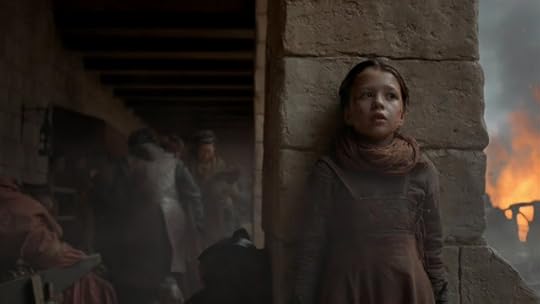
 However, for a long time I was wed to the theory that Jaime, as Cersei’s slightly younger twin, would ultimately be the valonqar (“little brother”) prophesied to choke her to death rather than the more obvious Tyrion who, let’s face it, has both motive and form. Last week, as Jaime did his best to convince Brienne that he’s the evil bastard he’s long been purported to be, thereafter riding off towards King’s Landing, I was utterly convinced that Cersei would die with his hands – golden and otherwise – wrapped around her pale white throat. It seemed inevitable that she’d refuse to surrender to Dany and/or flee with Jaime; that Jaime would learn of Euron’s warming of her bed in his absence; and that the former Kingsguard commander would finally snap, thus bringing one of the most captivating character arcs in the saga to a thrilling and seemingly inexorable close. That wasn’t to be, though, with the show instead delivering what for me was the greatest shock of “The Bells”.
However, for a long time I was wed to the theory that Jaime, as Cersei’s slightly younger twin, would ultimately be the valonqar (“little brother”) prophesied to choke her to death rather than the more obvious Tyrion who, let’s face it, has both motive and form. Last week, as Jaime did his best to convince Brienne that he’s the evil bastard he’s long been purported to be, thereafter riding off towards King’s Landing, I was utterly convinced that Cersei would die with his hands – golden and otherwise – wrapped around her pale white throat. It seemed inevitable that she’d refuse to surrender to Dany and/or flee with Jaime; that Jaime would learn of Euron’s warming of her bed in his absence; and that the former Kingsguard commander would finally snap, thus bringing one of the most captivating character arcs in the saga to a thrilling and seemingly inexorable close. That wasn’t to be, though, with the show instead delivering what for me was the greatest shock of “The Bells”.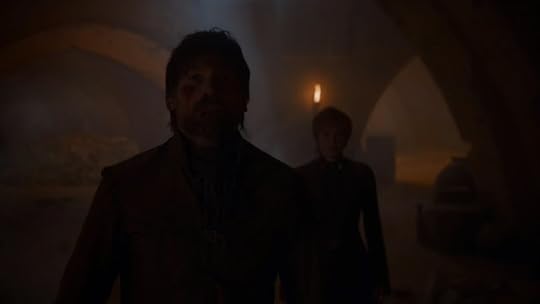 Of course, the problem with being so completely wrong-footed by a development is that it can really alienate you. Perhaps I should have smelled a rat when the show omitted the valonqar from Maggy’s prophecy back at the start of Season 5 – Weiss and Benioff have clearly had their endgame in mind for a long time now, and as this omission suggests, their endgame may not necessarily be Martin’s. However, despite feeling much like I imagine
The Last Jedi
’s detractors did as they watched Rian Johnson pull the rug out from under them, I still couldn’t help but be pulled into the emotion of the moment. Jaime might have been redeemed after his third-season ordeal in the eyes of many, but years later he was still prepared to trebuchet babies into Riverrun if that would get him back into Cersei’s arms more quickly, and it’s the feelings driving such extreme behaviour that “The Bells” exploits. Jaime wasn’t trying to convince Brienne of anything last week; he was being honest, and neither we nor her could accept it because we want to see the good in him. The truth is, though, his liberation from Cersei had simply forced to him face up to who he really is, and learn to accept it. That’s his tragedy - escaping the controlling clutches of the woman he loves, only to realise that he doesn’t want to. Just like Dany’s descent, it’s incredibly hard to watch, and even harder to stomach, but somehow Weiss and Benioff make you care about the plight of two amoral and incestuous siblings who have more blood on their hands than almost anyone else on the show. Jaime and Cersei’s despairing, romantic and ultimately tragic demise was one of the most raw and affecting death scenes that I’ve seen since Owen Harper’s raging demise in Torchwood’s “Exit Wounds” more than a decade ago. Even though it flew completely in the face of what I thought I wanted to see, I loved it nevertheless.
Of course, the problem with being so completely wrong-footed by a development is that it can really alienate you. Perhaps I should have smelled a rat when the show omitted the valonqar from Maggy’s prophecy back at the start of Season 5 – Weiss and Benioff have clearly had their endgame in mind for a long time now, and as this omission suggests, their endgame may not necessarily be Martin’s. However, despite feeling much like I imagine
The Last Jedi
’s detractors did as they watched Rian Johnson pull the rug out from under them, I still couldn’t help but be pulled into the emotion of the moment. Jaime might have been redeemed after his third-season ordeal in the eyes of many, but years later he was still prepared to trebuchet babies into Riverrun if that would get him back into Cersei’s arms more quickly, and it’s the feelings driving such extreme behaviour that “The Bells” exploits. Jaime wasn’t trying to convince Brienne of anything last week; he was being honest, and neither we nor her could accept it because we want to see the good in him. The truth is, though, his liberation from Cersei had simply forced to him face up to who he really is, and learn to accept it. That’s his tragedy - escaping the controlling clutches of the woman he loves, only to realise that he doesn’t want to. Just like Dany’s descent, it’s incredibly hard to watch, and even harder to stomach, but somehow Weiss and Benioff make you care about the plight of two amoral and incestuous siblings who have more blood on their hands than almost anyone else on the show. Jaime and Cersei’s despairing, romantic and ultimately tragic demise was one of the most raw and affecting death scenes that I’ve seen since Owen Harper’s raging demise in Torchwood’s “Exit Wounds” more than a decade ago. Even though it flew completely in the face of what I thought I wanted to see, I loved it nevertheless. The greatest performance in “The Bells”, though, was Kit Harington’s. In a tragic mirror of the look that Daenerys wore at last week’s feast, there is a moment when you can see Jon suffer the exact same epiphany – and he’s no more happy about it than she was. With the lines between good and evil blurring around him as the Dothraki return to their old ways; the Northerners turn to rape and pillage; and even Greyworm leads the Unsullied into massacring Lannister troops who’ve thrown down their arms in surrender, the fog almost visibly lifts before him. Watching the woman he loves razing a city to the ground, watching her – as Sapochnik goes to great pains to harrowingly illustrate – burn innocent children to death, Jon’s posture changes as, once again, the weight of the world is heaved back up onto his shoulders, and, knowing him, all the blame for it too. He knows that there’s no way back for Dany now, just as we do, and it’s with clear resignation that he beats his retreat out of King’s Landing, no doubt bound for next week’s final showdown with his auntie ex.
The greatest performance in “The Bells”, though, was Kit Harington’s. In a tragic mirror of the look that Daenerys wore at last week’s feast, there is a moment when you can see Jon suffer the exact same epiphany – and he’s no more happy about it than she was. With the lines between good and evil blurring around him as the Dothraki return to their old ways; the Northerners turn to rape and pillage; and even Greyworm leads the Unsullied into massacring Lannister troops who’ve thrown down their arms in surrender, the fog almost visibly lifts before him. Watching the woman he loves razing a city to the ground, watching her – as Sapochnik goes to great pains to harrowingly illustrate – burn innocent children to death, Jon’s posture changes as, once again, the weight of the world is heaved back up onto his shoulders, and, knowing him, all the blame for it too. He knows that there’s no way back for Dany now, just as we do, and it’s with clear resignation that he beats his retreat out of King’s Landing, no doubt bound for next week’s final showdown with his auntie ex.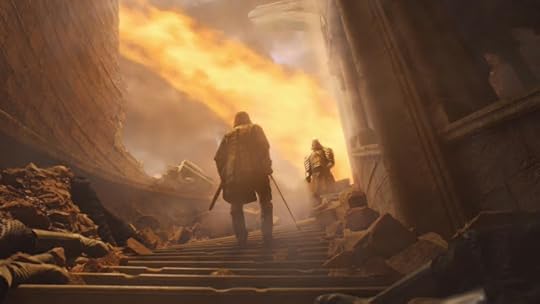 As showdowns go, Jon’s with Daenerys will have to work damned hard to top this episode’s. Euron’s swaggering demise at the hands - hand - of Jaime was an ugly, messy, catch-as-catch-can slog of an encounter that had me teetering on the brink of my seat throughout, and the long-awaited clash between the Hound and his brother the Mountain managed to live up to all the staggering hype surrounding it. Fair dues, there had been no good reason for it to happen – whilst the Hound has always hated his brother, it’s only been since fans started clamouring for them to square off that he’s made it his mission to either put him down or die trying – but their battle was executed flawlessly nonetheless, and the writers even imbued it with a narrative purpose, using it to not only to bring closure to the long-running Arya / Hound arc, but do so in such a way that it might even save Arya from herself. Moreover, with Drogon circling and spitting out fire, the Red Keep collapsing around them and Qyburn’s pulped body at their feet it was by far the series’ most visually arresting one-on-one bout, and it gives the Hound a far more fitting send-off than some other beloved side characters – here’s looking at you, Ghost.
As showdowns go, Jon’s with Daenerys will have to work damned hard to top this episode’s. Euron’s swaggering demise at the hands - hand - of Jaime was an ugly, messy, catch-as-catch-can slog of an encounter that had me teetering on the brink of my seat throughout, and the long-awaited clash between the Hound and his brother the Mountain managed to live up to all the staggering hype surrounding it. Fair dues, there had been no good reason for it to happen – whilst the Hound has always hated his brother, it’s only been since fans started clamouring for them to square off that he’s made it his mission to either put him down or die trying – but their battle was executed flawlessly nonetheless, and the writers even imbued it with a narrative purpose, using it to not only to bring closure to the long-running Arya / Hound arc, but do so in such a way that it might even save Arya from herself. Moreover, with Drogon circling and spitting out fire, the Red Keep collapsing around them and Qyburn’s pulped body at their feet it was by far the series’ most visually arresting one-on-one bout, and it gives the Hound a far more fitting send-off than some other beloved side characters – here’s looking at you, Ghost.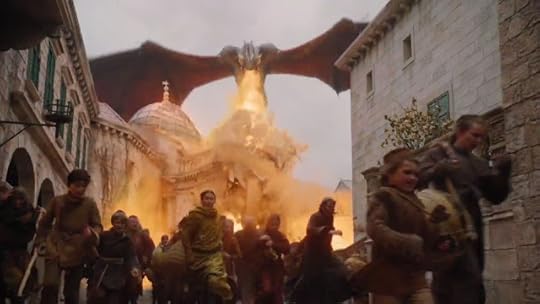 A keen fan of Tolkien, and The Lord of the Rings in particular, George R R Martin suggested years ago that A Song of Ice and Fire would conclude with a Westerosi version of “The Scouring of the Shire” – the thematically crucial penultimate chapter of The Return of the King that, thanks to Peter Jackson, will be unfamiliar to those who’ve only seen Jackson’s cinematic adaptations. “The Scouring of the Shire” always resonated with me because, in a bold departure from the literary norm, it dared to follow the Rings trilogy’s fiery finale with an anti-climactic skirmish as the weary Hobbits try to take back their home from Saruman. Tolkien was brave enough to remind a post-war world that the fight is never really over. That those who’ve sacrificed everything to save the world can’t ever really go back to living in it. War doesn’t just kill, it tarnishes and corrupts. Having Game of Thrones concluding with a modern, more nuanced take on Tolkien’s most profound and overlooked piece of work is an absolute masterstroke on Martin’s part, and I applaud the showrunners for respecting it.
A keen fan of Tolkien, and The Lord of the Rings in particular, George R R Martin suggested years ago that A Song of Ice and Fire would conclude with a Westerosi version of “The Scouring of the Shire” – the thematically crucial penultimate chapter of The Return of the King that, thanks to Peter Jackson, will be unfamiliar to those who’ve only seen Jackson’s cinematic adaptations. “The Scouring of the Shire” always resonated with me because, in a bold departure from the literary norm, it dared to follow the Rings trilogy’s fiery finale with an anti-climactic skirmish as the weary Hobbits try to take back their home from Saruman. Tolkien was brave enough to remind a post-war world that the fight is never really over. That those who’ve sacrificed everything to save the world can’t ever really go back to living in it. War doesn’t just kill, it tarnishes and corrupts. Having Game of Thrones concluding with a modern, more nuanced take on Tolkien’s most profound and overlooked piece of work is an absolute masterstroke on Martin’s part, and I applaud the showrunners for respecting it. 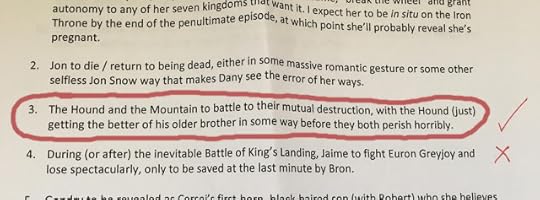 Above: Some of my predictions made after “The Long Night”. Well, one out of fifteen ain’t bad. And so now, for the first time in a long time I have absolutely no idea how the series is going to end next week. Will Arya kill Daenerys, as the writers seem to – far, far too obviously – be setting up? Or has Varys already done the deed with the “weapon of women and eunuchs”? Who will Bronn kill with his crossbow now that his would-be paymistress and half of his targets are dead? Does anyone fancy Davos’s chances of survival, given the role that he played in helping Tyrion to free Jaime? Will Jon really end up sitting on the Iron Throne? Or will he retire into the North, Frodo-style, to reunite with Ghost and leave the ruling to Tyrion, Sansa - or even Bran? Could Dany survive and break the wheel after all? Does Sam have a book to write...? And wasn’t there supposed to be some mystical, Old-Gods significance to direwolves...?
Above: Some of my predictions made after “The Long Night”. Well, one out of fifteen ain’t bad. And so now, for the first time in a long time I have absolutely no idea how the series is going to end next week. Will Arya kill Daenerys, as the writers seem to – far, far too obviously – be setting up? Or has Varys already done the deed with the “weapon of women and eunuchs”? Who will Bronn kill with his crossbow now that his would-be paymistress and half of his targets are dead? Does anyone fancy Davos’s chances of survival, given the role that he played in helping Tyrion to free Jaime? Will Jon really end up sitting on the Iron Throne? Or will he retire into the North, Frodo-style, to reunite with Ghost and leave the ruling to Tyrion, Sansa - or even Bran? Could Dany survive and break the wheel after all? Does Sam have a book to write...? And wasn’t there supposed to be some mystical, Old-Gods significance to direwolves...?
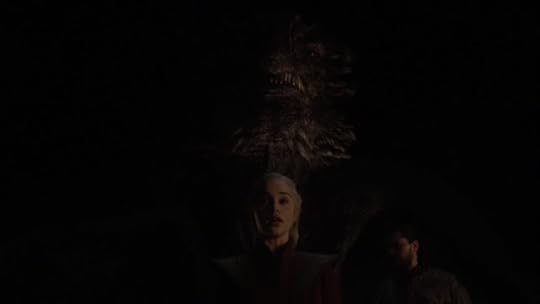
It might have drawn the ire of a large proportion of its viewership (as does anything which dares to not pander to its audience these days, sadly), but in setting fire to expectations Weiss and Benioff have restored Game of Thrones to its rightful place as king – no, queen - of shocking event television. Long live the Mad Queen, Westeros's answer to Darth Vader, with all the triumph and tragedy thereto. Next up: “Episode LXXIII: A New Hope”...
The first five episodes of Game of Thrones' final season are available to stream on NOW TV , with the final episode scheduled to drop on Monday 20th May. If you start a seven-day free trial now, you will get to watch the whole season for free!
Alternatively, the whole season will be available to download from iTunes in 1080p from Tuesday 21st May for just £16.99 - incredible value when you take into account that a newly released movie sells for £13.99 in the iTunes Store, and this season is effectively comprised of six! The season is also listed on Amazon Prime Video, with the episodes due to drop the same day as on iTunes, but as of the time of writing no price is given and the season is not available for pre-order. There is no word yet on a UK 4k or Blu-ray release.
Published on May 14, 2019 14:51
No comments have been added yet.
E.G. Wolverson's Blog
- E.G. Wolverson's profile
- 52 followers
E.G. Wolverson isn't a Goodreads Author
(yet),
but they
do have a blog,
so here are some recent posts imported from
their feed.



